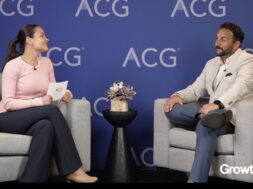ACG’s 2019 Public Policy Priorities
New lawmakers and a changing political landscape present opportunities and challenges for the middle market, and will drive ACG's public policy agenda in 2019.

The start of the 116th Congress brought a new crop of lawmakers, a changing political landscape, and increased opportunities and challenges for the middle market. Meanwhile, federal agencies are moving ahead with their deregulatory agenda under President Donald Trump. ACG’s 2019 public policy priorities reflect this dynamic, multifaceted environment and are designed to maximize our impact in Washington, D.C.
Education
Important policy discussions in Congress have historically focused on small and large companies, while the middle market has been left out. Lawmakers acknowledge the important role of small businesses in the economy and have made efforts to address their interests. Meanwhile, large companies have the financial resources to keep their issues front and center. That’s why informing policymakers about the critical role the middle market plays in the U.S. economy is the cornerstone of ACG’s work in Washington.
At the forefront of ACG’s congressional education program is the bipartisan Congressional Caucus for Middle Market Growth. Championed by ACG in coordination with the National Center for the Middle Market, the caucus serves as a platform to raise awareness on the outsized impact the middle market has on the U.S. economy. Additionally, the caucus educates members of Congress and their staff on the various ways policy proposals affect the middle market. During the last congressional session, the caucus held briefings on tax reform, cybersecurity and the options available to middle-market businesses looking to raise capital. In this Congress, ACG will engage in broad efforts—including through direct ACG member involvement—to grow membership in the caucus.
Protecting the Reputation of Middle-Market Change-Makers
With a divided Congress comes an increase in the possibility for political messaging bills designed to rally a party’s base and force a vote that can later be used against opponents. As the Democrat-led House Financial Services Committee turns its focus toward consumer protection and anti-Wall Street sentiment, those who create value in middle-market firms stand the chance of being caught up in a variety of political messaging bills.
ACG will continue to meet with policymakers to refute misinformation and set the record straight on the economic benefits of those who participate in the middle-market ecosystem. With a data-driven advocacy platform that includes research such as GrowthEconomy.org—a dynamic database tracking the immense growth spurred by private capital—we are able to provide hard evidence of the positive impact ACG’s members make in specific congressional districts.
Proactive Regulatory Engagement
A divided Congress means more highly publicized legislative activity and fewer bills passed into law. On the regulatory front, however, there is more opportunity to obtain relief and favorable policies for ACG members. There will be several key opportunities for ACG to engage with regulators in 2019, as the Securities and Exchange Commission focuses on accredited investors and advertising issues, the Treasury Department works to implement the 2017 Tax Cuts and Jobs Act, and policymakers evaluate laws such as the Volcker Rule and a host of other regulatory issues.
Broadening Our Reach
While policies that promote access to capital are core to ACG’s advocacy efforts, ACG will continue to evaluate opportunities to participate in broader policy conversations that impact the success of the middle market. With an increased focus by policymakers on issues such as manufacturing and the definition of a joint employer, there comes an increased need for middle-market representation. ACG works to elevate the voice of the middle market in broad policy discussions to ensure the continued success of our members and the greater middle-market ecosystem.
Peer Collaboration
With the wide swath of issues affecting midsize businesses, there is often the opportunity to join forces with other groups to maximize the impact of ACG’s advocacy. To most effectively harness the resources available to ACG’s public policy department, we plan to continue to identify peer organizations to work with in pursuit of our policy goals. This sort of coalition-building is essential to achieving success in Washington.
Strengthening the ACG PAC
The ACG PAC was formed in 2016 in order to strategically pool personal, voluntary funds from individual ACG members to help support and elect candidates that are champions of the middle market. The ACG PAC is a critical tool to promote ACG’s federal advocacy efforts to drive middle-market growth. In coordination with the ACG PAC committee, ACG plans to further strengthen the ACG PAC in 2019.
This story originally appeared in the May/June print edition of Middle Market Growth magazine. Read the full issue in the archive.
Are you an ACG member who enjoys reading the public policy roundup? Join our Public Policy Interest Group to receive even more in-depth coverage of federal policy activity impacting the middle market, as well as opportunities to help shape ACG’s advocacy efforts.

Maria Wolvin is ACG Global’s vice president and senior counsel, public policy.

Ben Marsico is ACG Global’s manager of legislative and regulatory affairs.


